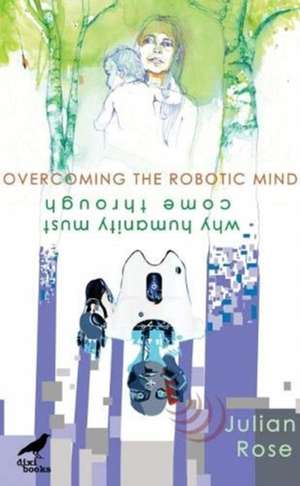Overcoming the Robotic Mind: Why Humanity Must Come Through
Autor Baron Julian Roseen Limba Engleză Paperback – 27 iun 2019
Preț: 134.25 lei
Nou
Puncte Express: 201
Preț estimativ în valută:
25.69€ • 26.66$ • 21.47£
25.69€ • 26.66$ • 21.47£
Carte indisponibilă temporar
Doresc să fiu notificat când acest titlu va fi disponibil:
Se trimite...
Preluare comenzi: 021 569.72.76
Specificații
ISBN-13: 9786197458473
ISBN-10: 6197458470
Pagini: 232
Dimensiuni: 135 x 210 x 22 mm
Greutate: 0.28 kg
Editura: Dixi Books Publishing
Colecția Dixi Books Publishing
ISBN-10: 6197458470
Pagini: 232
Dimensiuni: 135 x 210 x 22 mm
Greutate: 0.28 kg
Editura: Dixi Books Publishing
Colecția Dixi Books Publishing
Recenzii
The authors integrity, honesty and sincerity shine out from each page and the ever-present guiding thought that There is no us and them. There is only us. is a powerful, uplifting and crucial assertion. Finding a way to enable everyone to understand and desire such a truth, occupies the entire book and draws on Julian Roses committed and tireless engagement with the forces that shape our world It is a call for action and we all have, floating around in our subconscious, the knowledge that harm is not done by those who are bad but by those who do nothing.-- Rosamund Young, an early pioneer of organic farming in the UK and the author of an internationally acclaimed book called The Secret Life of Cows.
"I was touched by the uncompromising analysis of how earth and all life on it is under threat. Even more so by Julians dedication to find ways to overcome our ever faster slide into a dystopian future where the robotic mind, artificial intelligence and the internet of things will dominate and enslave humanity and all life. Julian shows how interconnected things are. One cannot separate our health from the effects of the electronic communication gadgets which steal more and more of our real lives. Nor can one separate the poisoning of the environment from the cut-throat non-morality of the dominant economic system. In his book, Julian touched on many things such as politics, agriculture, genetics, trans-humanism, war, technology, de-population, religion and spirituality. He inspires us to remember our own powers and responsibilities and gives us ideas of how we can overcome it. He reminds us of the power of NO, meaning having enough of the madness and the will to NOT go along with it any longer. Julian suggests that we return, by necessity, to our roots and that all those who can read the writing on the wall, should set their sights on getting re-earthed before the fault lines of change finally swallow up the outmoded and dysfunctional practices of yesteryear. -- R. Tecihman, an activist, writer, poet and a retired sea captain.
I find Julians book quite wonderful. The more so in that the series of essays unfold with the continuity and unity of a well-written novel. And yet nothing is fictional, all of it actual. -- Harvey Grossman, an internationally recognised theatre director and co-founder of The Institute for Creative Development.
"I was touched by the uncompromising analysis of how earth and all life on it is under threat. Even more so by Julians dedication to find ways to overcome our ever faster slide into a dystopian future where the robotic mind, artificial intelligence and the internet of things will dominate and enslave humanity and all life. Julian shows how interconnected things are. One cannot separate our health from the effects of the electronic communication gadgets which steal more and more of our real lives. Nor can one separate the poisoning of the environment from the cut-throat non-morality of the dominant economic system. In his book, Julian touched on many things such as politics, agriculture, genetics, trans-humanism, war, technology, de-population, religion and spirituality. He inspires us to remember our own powers and responsibilities and gives us ideas of how we can overcome it. He reminds us of the power of NO, meaning having enough of the madness and the will to NOT go along with it any longer. Julian suggests that we return, by necessity, to our roots and that all those who can read the writing on the wall, should set their sights on getting re-earthed before the fault lines of change finally swallow up the outmoded and dysfunctional practices of yesteryear. -- R. Tecihman, an activist, writer, poet and a retired sea captain.
I find Julians book quite wonderful. The more so in that the series of essays unfold with the continuity and unity of a well-written novel. And yet nothing is fictional, all of it actual. -- Harvey Grossman, an internationally recognised theatre director and co-founder of The Institute for Creative Development.
